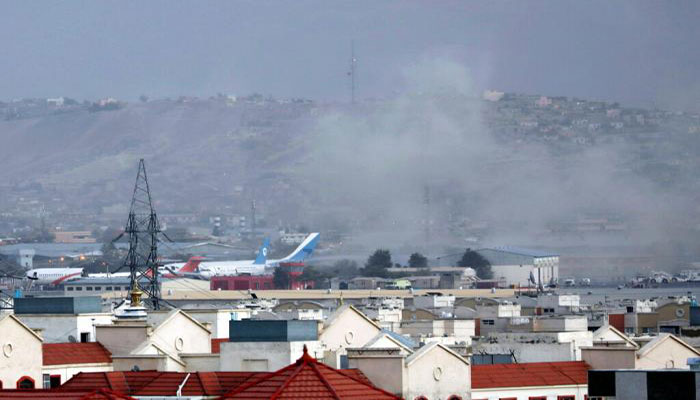No love lost between Daesh, Taliban
LAHORE: The ISIS-K or the Daesh-Khorasan, which claimed responsibility for the recent deadly attacks on Kabul Airport, had condemned the February 2020 pact between the Donald Trump administration and the Taliban — a development that eventually paved the way for an accord under which the US has withdrawn its soldiers from Afghanistan, archival research shows.
According to some American media houses, incumbent American President Joe Biden has been "handcuffed" for a decision actually taken by his aggressive predecessor, Donald Trump. The “New York Times” had reported a few days ago: “The ISIS-K views the Taliban as apostates, and not devout enough in terms of its approach to Islam. The group's leaders denounced the Taliban's takeover of Afghanistan.”
Less than a week ago, the “Business Insider,” an American financial and business news website founded in 2007, had asserted: “The ISIS-K first emerged in 2015, and staged attacks as early as April of that year. This was less than a year after ISIS took over a large swath of territory in Iraq and Syria, declaring a Caliphate (which has since collapsed). The current leader of ISIS-K is Shahab al-Muhajir, and the group is assessed to have somewhere between 1,500 to 2,000 fighters in Afghanistan, according to a United Nations report from June.”
On August 27, 2021, a reputed UAE-based newspaper “The Khaleej Times” had stated: “Following the Taliban's lightning takeover of Afghanistan, a number of militias around the world congratulated them — but not Daesh. One Daesh commentary published after the fall of Kabul accused the Taliban of betraying their cause with the US withdrawal deal and vowed to continue its fight, according to the SITE Intelligence Group, which monitors militant communications.”
The “Khaleej Times” had actually carried a report of the Paris-based global news agency, the Agence France-Presse (AFP).
The newspaper had gone on to write: “Months after Daesh declared a caliphate in Iraq and Syria in 2014, breakaway fighters from the Pakistani Taliban joined militants in Afghanistan to form a regional chapter, pledging allegiance to Daesh leader Abu Bakr Al Baghdadi. The group was formally acknowledged by the central Daesh leadership the next year as it sunk roots in northeastern Afghanistan, particularly Kunar, Nangarhar and Nuristan provinces.”
The media house had maintained: “It also managed to set up sleeper cells in other parts of Pakistan and Afghanistan, including Kabul, according to United Nations monitors. Latest estimates of its strength vary from several thousand active fighters to as low as 500, according to a UN Security Council report released last month. While both groups are hardline militants, there is no love lost between them. They have differed on the minutiae of religion and strategy. That tussle has led to bloody fighting between the two, with the Taliban emerging largely victorious after 2019 when Daesh-Khorasan failed to secure territory as its parent group did in the Middle East. In a sign of the enmity between the two militant groups, Daesh statements have referred to the Taliban as apostates.”
-
 Czech Republic Supports Social Media Ban For Under-15
Czech Republic Supports Social Media Ban For Under-15 -
 Prince William Ready To End 'shielding' Of ‘disgraced’ Andrew Amid Epstein Scandal
Prince William Ready To End 'shielding' Of ‘disgraced’ Andrew Amid Epstein Scandal -
 Chris Hemsworth Hailed By Halle Berry For Sweet Gesture
Chris Hemsworth Hailed By Halle Berry For Sweet Gesture -
 Blac Chyna Reveals Her New Approach To Love, Healing After Recent Heartbreak
Blac Chyna Reveals Her New Approach To Love, Healing After Recent Heartbreak -
 Royal Family's Approach To Deal With Andrew Finally Revealed
Royal Family's Approach To Deal With Andrew Finally Revealed -
 Super Bowl Weekend Deals Blow To 'Melania' Documentary's Box Office
Super Bowl Weekend Deals Blow To 'Melania' Documentary's Box Office -
 Meghan Markle Shares Glitzy Clips From Fifteen Percent Pledge Gala
Meghan Markle Shares Glitzy Clips From Fifteen Percent Pledge Gala -
 Melissa Jon Hart Explains Rare Reason Behind Not Revisting Old Roles
Melissa Jon Hart Explains Rare Reason Behind Not Revisting Old Roles -
 Meghan Markle Eyeing On ‘Queen’ As Ultimate Goal
Meghan Markle Eyeing On ‘Queen’ As Ultimate Goal -
 Japan Elects Takaichi As First Woman Prime Minister After Sweeping Vote
Japan Elects Takaichi As First Woman Prime Minister After Sweeping Vote -
 Kate Middleton Insists She Would Never Undermine Queen Camilla
Kate Middleton Insists She Would Never Undermine Queen Camilla -
 King Charles 'terrified' Andrew's Scandal Will End His Reign
King Charles 'terrified' Andrew's Scandal Will End His Reign -
 Winter Olympics 2026: Lindsey Vonn’s Olympic Comeback Ends In Devastating Downhill Crash
Winter Olympics 2026: Lindsey Vonn’s Olympic Comeback Ends In Devastating Downhill Crash -
 Adrien Brody Opens Up About His Football Fandom Amid '2026 Super Bowl'
Adrien Brody Opens Up About His Football Fandom Amid '2026 Super Bowl' -
 Barbra Streisand's Obsession With Cloning Revealed
Barbra Streisand's Obsession With Cloning Revealed -
 What Did Olivia Colman Tell Her Husband About Her Gender?
What Did Olivia Colman Tell Her Husband About Her Gender?




